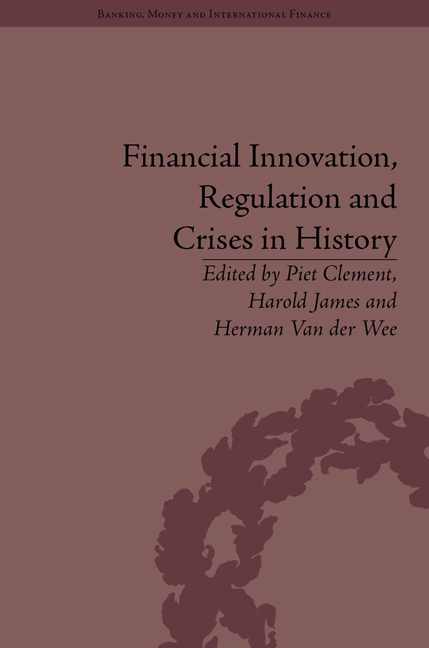Book contents
- Frontmatter
- CONTENTS
- Acknowledgements
- List of Contributors
- List of Figures and Tables
- Note on the Text
- Part I Introduction
- Part II Episodes of Financial Innovation, Regulation and Crisis in History
- 2 Contract Enforcement on the World's First Stock Exchange
- 3 Co-operative Banking in the Netherlands in pre-Second World War Crises
- 4 The Discreet Charm of Hidden Reserves: How Swiss Re Survived the Great Depression
- 5 The Redesign of the Bank–Industry–Financial Market Ties in the US Glass–Steagall and the 1936 Italian Banking Acts
- 6 Regulation and Deregulation in a Time of Stagflation: Siegmund Warburg and the City of London in the 1970s
- 7 Financial Market Integration: An Insurmountable Challenge to Modern Trade Policy?
- Part III Innovation, Regulation and the Current Financial Crisis
- Notes
- Index
7 - Financial Market Integration: An Insurmountable Challenge to Modern Trade Policy?
from Part II - Episodes of Financial Innovation, Regulation and Crisis in History
- Frontmatter
- CONTENTS
- Acknowledgements
- List of Contributors
- List of Figures and Tables
- Note on the Text
- Part I Introduction
- Part II Episodes of Financial Innovation, Regulation and Crisis in History
- 2 Contract Enforcement on the World's First Stock Exchange
- 3 Co-operative Banking in the Netherlands in pre-Second World War Crises
- 4 The Discreet Charm of Hidden Reserves: How Swiss Re Survived the Great Depression
- 5 The Redesign of the Bank–Industry–Financial Market Ties in the US Glass–Steagall and the 1936 Italian Banking Acts
- 6 Regulation and Deregulation in a Time of Stagflation: Siegmund Warburg and the City of London in the 1970s
- 7 Financial Market Integration: An Insurmountable Challenge to Modern Trade Policy?
- Part III Innovation, Regulation and the Current Financial Crisis
- Notes
- Index
Summary
The last sixty years have been an era of rapid globalization. While reduction of transportation and communication costs contributed to the development of trans-border economic activities, the single most significant contribution came from modern trade policy. Eight negotiating rounds under the auspices of the General Agreement on Tariffs and Trade (GATT) proved to be instrumental in rolling back barriers to trade and protecting the trading system against protectionist backlash. Multilateral regulations such as the most favoured nation clause (MFN) helped create a rules-based international level-playing field with high transparency and reliability. Besides the GATT and the World Trade Organization (WTO), regional agreements also contributed to these advances. Although such preferential trade agreements (PTAs) are discriminatory vis-á-vis non-member countries and thus only a second-best solution, they have helped to tackle new and controversial trade policy issues.
While the importance of modern trade policy for the globalization process is well known, it is less clear what role it has played in the last sixty years in the integration of service markets and especially of financial service markets: Have financial services been subject to regional or multilateral trade policy initiatives? If so, how successful have these initiatives been in rolling back barriers and securing liberalization commitments? Have such policy initiatives brought advantages to global financial markets such as improved transparency and reliability? Have rules such as MFN been employed to ensure the same market access conditions to firms of different nationalities?
- Type
- Chapter
- Information
- Financial Innovation, Regulation and Crises in History , pp. 107 - 126Publisher: Pickering & ChattoFirst published in: 2014



